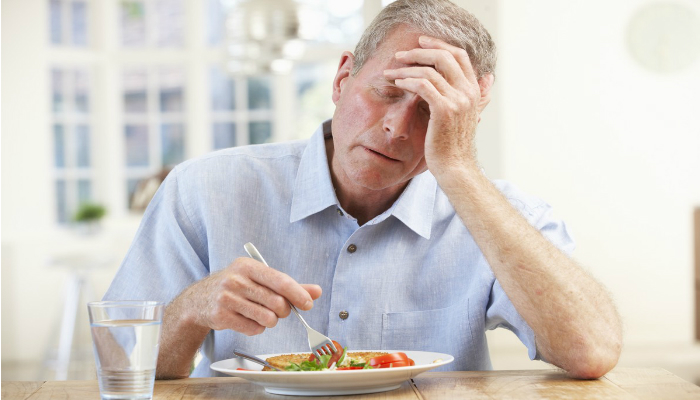
Many believe that loss of appetite is a common issue faced by elderly which is true up to some extent. While reduced metabolic rate due to decreased physical activities is the major factor that leads to loss of appetite, few physiological and psychological factor also contribute to this issue. In some cases, it could also be one of the symptoms of a major health issue.
Food consumption at the regular intervals is a bodily need in order to keep it functioning. Appetite is the desire created by the mind to indicate the need for eating food. It is divided into three components such as hunger, satiation and satiety. Hunger is the sensation that conveys the need of food consumption, satiation is the sensation of fullness after consuming sufficient food and satiety is a feeling that exists between food consumption intervals.
Loss of appetite, medically termed as anorexia nervosa, leads to serious nutritional deficiency conditions if left unnoticed and untreated. The unfortunate fact is that over 26% of the loss of appetite cases are left unnoticed only to realize when the elders were suffering from it for more than 3-6 months.
The early warning signs of anorexia are difficult to distinguish from the regular eating habits as the symptoms may also be associated with other health issues. Here are a few physical indications through which you could spot the symptoms and prevent loss of appetite issue in your loved ones.
Physical Indications
- Weight loss for no apparent reason
- Insomnia and fatigue feel
- Elevated liver enzymes and abnormal blood readings
- Abdominal pain and constipation
- Giddiness and faints that are frequent
- Dry skin and mouth
- Dehydration
- Low blood pressure
- Swelling of arms and legs
Behaviourial Indications
- Denial of hunger even when starving
- Rigid eating habits
- Making excuses to not to eat
- Over or lack of emotion
- Not wanting to eat along with other family members
- Wasting or hiding food
- Lying about the food they have eaten
What Leads to Loss of Appetite
Loss of appetite induced by the viral infections and other illnesses that are short-term could be reversed along with the infection. However, in the senior population, there are an array of factors that cause anorexia are long-term and in some cases it is irreversible. Here are few factors that cause long-term loss of appetite in the elderly.
- Changed Food Preferences – Due to age-related degeneration, the taste buds tend to change. This may force the seniors to constantly change their food preferences.
- Side Effects of the Medications – Elderly age is associated with many health issues and seniors need to take medications on a regular basis. Few of these medications may cause loss of appetite or a feeling of fullness without actually eating anything.
- Depression – Prolonged idleness during the post-retirement stage leads to depression and loneliness. Seniors develop few behavioral changes which include showing least interest in consuming food.
- Alzheimer’s and Dementia – These neurological disorders cause loss of appetite as seniors with these conditions may forget to eat food. There is an essential need to provide such seniors with the help of personal attenders.
- Side Effects of Health Conditions – Health issues such as kidney failure, chronic liver conditions, thyroid disorders and loss of strength.
- Loneliness – If the elders are living on their own, there are many chances for them to develop this condition as they neglect their eating habits due to lack of strength to prepare food and do other house chores.
Consequences of Loss of Appetite
Loss of appetite leads to numerous complications that have fatal consequences. This may result in arrhythmias (abnormal heart beats), essential nutrients and minerals such as potassium, sodium and calcium to maintain the fluids in the body.
In addition, anemia, osteoporosis, gastrointestinal issues, mitral valve prolapse, cardiovascular diseases, increased risk of fractures and loss of muscle. In addition, psychological issues such as depression, personality disorders and anxiety issues.
How to Find a Solution for Loss of Appetite?
If your elders are showing the indications of loss of appetite, it is imperative for you to seek medical help, immediately. The nutritionists or the dietitian will evaluate the condition and provide the elder with the diet plan that includes additional supplements. In addition, you can adhere to the following tips to help your elders to eat better.
Make sure your elder is provided with an opportunity to eat socially. Observe their diet pattern regularly and check with your dietitian at frequent intervals. Thorough medical check-ups and psychotherapy also help if the expected progress is not visible in your elders.
All seniors deserve to experience the retired life to its fullest. Provide them with an atmosphere where they could feel the essence of a holistic living experience.




